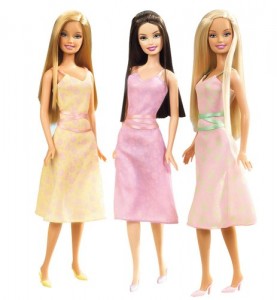Filed under: Uncategorized
Growing up Barbie was the epitome toy that every young girl wanted. She was a simple doll that, if bought additionally, could do anything society had to offer; of course those things were feminine. Barbie had a dog, daughter, a husband, and various cars, dream houses, and occupations. Barbie was the girl that young girls dream they would be. However, ignorant to social expectations, a young girl doesn’t realize the pressure that Barbie is captivated from. Barbie has luxurious flowing blonde hair, strikingly perfect physique, large breast, and a small waist. She has the natural arch in her foot given that she only wear heels and the perfect life with a family, job, home, car, and a beautiful group of friends. Barbie is a doll that subconsciously illustrates to young girls what they should aim to be. It sends a message that with beautiful looks and a slim sculpted body, they too can be popular and successful.
While growing up, never once did I notice, an athletic Barbie, police Barbie, or firefighter Barbie that wasn’t in an inappropriate dress as if it was a young adult Halloween costume. Barbie doesn’t acknowledge the “masculine” acting or athletically built women as the doll was made on society expectations for Barbie to be eye candy for males. Majority of the Barbie dolls that were created were swimsuit Barbie, pageant Barbie, or preppy Barbie. The fact that education, dominance, working class Barbie doesn’t exist creates a stepping stone in a young girl head that her purpose in life is to be thin and beautiful. Even if Barbie was given a professional role it was one of a nurse, teacher, or baker and still her role had a stereotypical sex appeal to it.
Alongside her submissive and dainty appearance is the lack of culture that surrounds Barbie. Barbie groups of friends consist of majority white ditzy girls and one black and Hispanic doll. They aren’t as present around and even if they are present they give a misrepresentation of the culture they are perceived to be. All the girls have long synthesized hair, thin frames, and a preppy look about them. They represent the upper class families since the dream houses are those of mansions and fancy décor and their cars are drop top corvettes and not Buicks.
As a child I played with Barbie because I was oblivious to society’s input on what a woman should look and act like. I ignored the sexual implications that Barbie displayed and the lack of education and athleticism she never displayed. I was nonchalant to the fact wearing tennis shoes wasn’t acceptable for Barbie as well as anything that wasn’t a skirt, dress, tight, cropped, or mini. Barbie is a figment of imagination socially constructed to criticize women who do not follow the social norms of beauty. What society fails to realize is that Barbie is plastic. She is fake. She is manmade. And so are her expectations.

